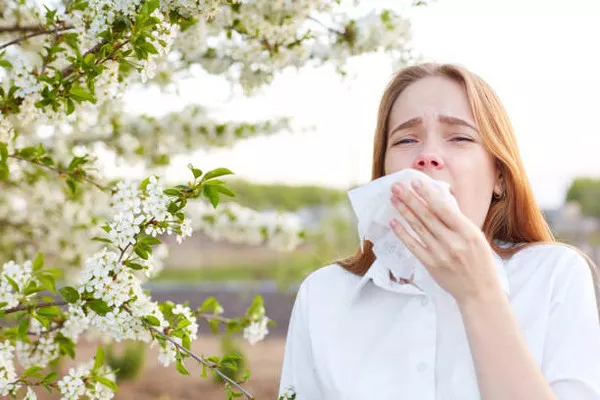Allergies are a common concern for many people, and one of their most irritating symptoms is a sore throat. When allergies strike, they can leave you with a scratchy, itchy, or painful throat that makes everyday activities uncomfortable. In this comprehensive guide, we will explore various strategies to effectively treat sore throats caused by allergies. Whether you suffer from seasonal allergies or year-round sensitivities, understanding how to manage allergies and alleviate throat discomfort is essential for maintaining your overall well-being.
Understanding Allergies and Sore Throats
Allergies are your body’s immune system’s overreaction to normally harmless substances, known as allergens. Common allergens include pollen, dust mites, pet dander, mold spores, and certain foods. When you are exposed to these allergens, your immune system releases chemicals, such as histamines, that trigger allergy symptoms. For many individuals, sore throat is a prevalent symptom of allergies, often accompanied by sneezing, runny nose, and itchy, watery eyes.
Identifying Allergens and Their Impact on Your Throat
To effectively treat a sore throat related to allergies, it’s crucial to identify the specific allergens triggering your symptoms. Here are some common allergens that can contribute to a sore throat:
Pollen: Pollen from trees, grasses, and weeds can be a major allergen, especially during certain seasons. Exposure to airborne pollen can lead to throat irritation and discomfort.
Dust Mites: These microscopic creatures thrive in bedding, upholstery, and carpets. Inhaling dust mite allergens can lead to throat inflammation and congestion.
Pet Dander: Allergens found in pet dander, which includes tiny flecks of skin, fur, or feathers, can cause a sore throat if you’re allergic to them.
Mold Spores: Mold spores can be found indoors and outdoors. Inhaling these spores can result in allergy symptoms, including a sore throat.
Food Allergies: Certain foods, such as nuts, dairy products, and shellfish, can trigger allergic reactions that manifest as a sore throat.
Identifying the specific allergen that affects you is the first step in managing your allergy-related sore throat effectively. Consult with an allergist for allergy testing if you are unsure about your triggers.
Treating Allergies to Relieve Your Sore Throat
Once you’ve identified the allergen responsible for your sore throat, it’s time to explore allergy treatments that can help alleviate your symptoms and improve your overall quality of life.
1.Over-the-Counter (OTC) Allergy Medications
Allergy medications available without a prescription can provide significant relief from sore throat symptoms caused by allergies. These medications are designed to target various allergy-related symptoms, including throat discomfort.
Antihistamines: OTC antihistamines, such as loratadine (Claritin) or cetirizine (Zyrtec), can effectively reduce histamine-related symptoms like throat itchiness and sneezing.
Decongestants: Decongestants like pseudoephedrine (Sudafed) can help relieve nasal congestion, which often accompanies a sore throat due to allergies.
Nasal Corticosteroid Sprays: These sprays, including fluticasone (Flonase) and mometasone (Nasonex), can alleviate nasal congestion and postnasal drip, which can contribute to a sore throat.
Saline Nasal Rinse: Rinsing your nasal passages with a saline solution can help remove allergens and reduce throat irritation.
Throat Lozenges: Sore throat lozenges with ingredients like menthol or honey can provide temporary relief from throat pain.
OTC allergy medications are generally safe when used as directed, but it’s essential to consult with a healthcare professional if you have any underlying health conditions or are taking other medications.
2.Allergen Avoidance
One of the most effective ways to prevent allergy-related sore throats is to avoid allergens as much as possible. Here are some practical steps you can take:
Pollen Allergies: Check local pollen counts and try to stay indoors during high pollen seasons. Keep windows closed, and use air purifiers to reduce pollen indoors.
Dust Mite Allergies: Use allergen-proof covers on pillows and mattresses. Wash bedding regularly in hot water. Vacuum and dust your home frequently.
Pet Allergies: If you’re allergic to pets, consider limiting your exposure. Create pet-free zones in your home and use high-efficiency particulate air (HEPA) filters in your HVAC system.
Mold Allergies: Address any moisture issues in your home to prevent mold growth. Use a dehumidifier in damp areas and clean visible mold with appropriate precautions.
Food Allergies: Strictly avoid foods that trigger your allergies, and read food labels carefully. Carry an epinephrine auto-injector if your allergies are severe.
Allergen avoidance can be highly effective in preventing allergy symptoms, including sore throat, but it may not always be possible to completely eliminate exposure to allergens.
3.Allergy Shots (Immunotherapy)
For individuals with severe allergies that do not respond well to other treatments, allergy shots, or immunotherapy, may be recommended. Allergy shots involve regular injections of small amounts of the allergen over time to desensitize your immune system. This can help reduce the severity of allergy symptoms, including sore throat, in the long run.
It’s important to note that allergy shots are typically reserved for individuals with specific allergies and are administered under the supervision of an allergist.
4.Allergy-Related Sore Throat Home Remedies
In addition to medical treatments, there are several home remedies that can provide relief for allergy-related sore throats:
Hydration: Drink plenty of water to keep your throat moist and help thin mucus.
Steam Inhalation: Inhaling steam from a bowl of hot water can soothe your throat and ease congestion.
Honey and Warm Tea: Honey has natural antibacterial properties and can soothe a sore throat. Add it to a cup of warm herbal tea for relief.
Salt Gargle: Gargling with warm salt water can reduce throat inflammation and discomfort.
Humidifier: Use a humidifier in your bedroom to maintain optimal humidity levels, which can prevent throat dryness.
Allergen-Reducing Measures: Implement allergen-reducing measures in your home, such as using high-efficiency air filters and keeping windows closed during high pollen seasons.
It’s essential to remember that while these remedies can provide relief, they may not be a substitute for medical treatment, especially if your symptoms are severe or persistent.
When to Seek Medical Attention
While most allergy-related sore throats can be managed effectively with the strategies mentioned above, there are instances when you should seek medical attention:
Severe Symptoms: If you experience severe throat swelling, difficulty breathing, or a sudden drop in blood pressure, seek immediate medical help, as these may be signs of a severe allergic reaction (anaphylaxis).
Persistent Symptoms: If your sore throat and allergy symptoms persist despite over-the-counter treatments and allergen avoidance, consult with an allergist or an ear, nose, and throat (ENT) specialist.
Frequent Infections: Frequent sore throats can be a sign of an underlying issue. If you experience recurrent sore throats, consult with a healthcare provider to rule out other causes.
Allergy Testing: If you are unsure about your allergy triggers or need personalized treatment options, consider undergoing allergy testing to identify your specific allergens.
Conclusion
Allergies can significantly impact your quality of life, especially when they lead to a sore throat and related symptoms. By understanding your allergens, implementing effective allergy management strategies, and utilizing appropriate treatments, you can reduce the frequency and severity of allergy-related sore throats.
Remember that everyone’s allergies are unique, and what works for one person may not work for another. It’s crucial to work closely with healthcare professionals, such as allergists, to develop a personalized treatment plan tailored to your specific needs. With the right approach, you can minimize the discomfort of allergy-related sore throats and enjoy a better quality of life.
[inline_related_posts title=”You Might Be Interested In” title_align=”left” style=”list” number=”6″ align=”none” ids=”2512,2449,2446″ by=”categories” orderby=”rand” order=”DESC” hide_thumb=”no” thumb_right=”no” views=”no” date=”yes” grid_columns=”2″ post_type=”” tax=””]



































